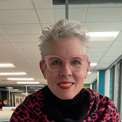KEY TAKEAWAYS
- Pink Fund has coined the term “Breast Cancer UnAwareness Month” to highlight the lack of awareness about non-medical financial support for survivors.
- Diagnosis can lead to significant financial challenges, including loss of income, medical expenses, and other costs like transportation and accommodation.
- Patients and survivors can take steps to mitigate financial impact, such as reviewing health insurance, creating a budget, exploring assistance programs, managing medical expenses, and communicating with creditors.
October is widely known as Breast Cancer Awareness Month, and while supporters and survivors often give back and reflect during this month, the financial burden of a breast cancer diagnosis is not commonly top of mind. This is why we at Pink Fund have coined the term Breast Cancer UnAwareness Month™. Many survivors are unaware that financial support like this exists, and many supporters are unaware of the need for non-medical financial assistance.
At its core, Pink Fund provides financial support, but also strives to serve as a resource for survivors, at any stage of a diagnosis.
As a breast cancer survivor, I know all too well what it’s like to battle the financial burdens of breast cancer while undergoing treatment to battle the disease. Diagnosed with early-stage breast cancer in April 2005, the disease was unlikely to take my life, but it did take my livelihood. I was between jobs, and my family’s already tight budget was immediately overrun by the addition of a monthly COBRA health insurance payment, and I lost my income.
Within months, we faced the potential for catastrophic financial losses, including the loss of our home. At the end of treatment when family and friends stopped delivering dinner, I found myself in the basement of a local church food pantry to help feed my family.
I quickly learned that this experience was not unique to me, and in some instances, much more dire for others. While sitting alongside other women in treatment waiting rooms, women with much more advanced disease than mine and longer and more toxic treatment protocols, I listened as they discussed their options. From selling their homes, to pulling kids home from college to liquidating retirement funds and paying the penalty. The most egregious was STOPPING TREATMENT AND GOING BACK TO WORK, risking the very real potential for earlier mortality.

Set up a savings plan with assistance from GreenPath counselors. Call today to speak with an expert for free.
They were literally making a choice between their very lives and their livelihoods.
It isn’t just time off and lost wages impacting those decisions. It was the cost of gas to get to and from appointments, parking fees, money spent on take-out meals, and sometimes overnight stays in nearby hotels when treatment centers were far from home.
When health care deductibles and co-pays collide with lost income, patients experience a side effect known as financial toxicity.
A 2020 study of breast cancer patients under 40 showed that 47% of the women surveyed were in financial decline due to their diagnosis. Forty-seven percent of the women also had to take unpaid time off work for their treatments.
I know this problem is nothing we can ever truly solve, but there are steps women and families can take upon receiving this diagnosis that may soften the financial blow.
- Review Your Health Insurance: Take an in-depth look at your health insurance policy. The first step is to thoroughly understand your health insurance coverage. Ensure you know what treatments, medications, and services are covered, as well as any out-of-pocket expenses you may incur. If you have had a significant change in circumstances, you may be eligible under the Affordable Care Act to change your insurance.
- Create a Budget: Establish a detailed budget that includes all your monthly expenses, such as rent or mortgage, utilities, groceries, and transportation. Identify areas where you can cut costs or find more affordable alternatives should you experience a loss of income.
- Explore Financial Assistance Programs Early On: The social worker or financial navigator where you are receiving treatment may be able to help identify resources and help you apply for support.
- Manage Medical Expenses: Keep detailed records of all medical expenses, including co-pays, prescriptions, and travel costs. These expenses may be tax-deductible. Also pay close attention to your explanation of benefits, not all medical bills are correct. Don’t be afraid to ask questions. Sometimes it is as simple as a misspelled name. For instance, I am Molly MacDonald and often my name is misspelled as McDonald, and there could literally be another Molly McDonald whose bill I am receiving. Check to see that your address is correct and review your bills, line by line. It is estimated that as much as 30% of medical bills are incorrect.If you are being treated in a Federally Qualified Health Center, FQHC, your deductibles and co-pays may be covered. Dollar For, dollarfor.org helps patients apply for charity care through their easy-to-use patient support program. Each hospital runs its own charity care program and decides how patients must apply and who qualifies. Hospitals typically consider the patient’s income, the number of people in the household, and the bill’s age when deciding who qualifies.
- Communicate with Creditors: If you anticipate difficulty paying bills, reach out to your creditors. They may be able to work with you on a modified payment plan or provide temporary relief. You may find that some agencies will be lenient.
In hindsight, it’s important to be prepared early on in your diagnosis. When I asked the social worker where I was being treated for help in solving my issue of financial toxicity, apart from a $50 Kroger gift card, she was unaware of any options to provide non-medical financial assistance.
One of our recipients, Samantha, said she was so shocked to receive her diagnosis that the financial aspects didn’t even cross her mind: “I had to go on leave from my long-time job and quickly depleted my PTO. Once I started treatment, my partner had to stop working as well to help care for myself and our three children, leaving us without any income.”
Women and their families should not be faced with impossible choices, like paying for their medication or mortgage, or making a car payment instead of paying for chemotherapy.
They shouldn’t have to, but the fact is they do, which is why my husband Tom and I started Pink Fund 17 years ago.
Pink Fund provides 90 days of non-medical financial aid to cover the basic costs of living expenses, for housing, transportation, utilities and insurance. By providing this financial assistance, Pink Fund helps to meet basic needs, while also decreasing stress levels. These factors help breast cancer patients focus on healing and improve survivorship outcomes and quality of life. Since its founding through August 2023, Pink Fund has made over $7.5 million in bill payments directly to patient’s creditors.
We’ve helped women like Brenda, a single mother of six, who in her own words did “not have the luxury of spare time and did not have time to be sick with cancer.” She couldn’t afford to take the mandatory time off for her treatment and said that financial support from Pink Fund made it possible for her and her children to survive.
Another recipient, Dannetta, had to go on FMLA due to treatments and side effects: “It was really hard because I didn’t have an income. As I am recovering, I am still undergoing treatment and have not returned to work.” She was facing eviction and just trying to keep her head above water. Pink Fund was able to pay three months of her rent.
Breast cancer treatment is a challenging journey, but by carefully managing your finances and seeking available resources, you can alleviate some of the financial stress and focus on your recovery.
Don’t hesitate to reach out to financial advisors or social workers who can provide guidance tailored to your specific situation.
GreenPath Financial Wellness is a trusted national non-profit that can help with financial counseling, debt management and a host of services that can help you rebuild your financial health.
While it may be embarrassing to ask for help, it is far worse to lose everything you have worked hard for or be forced into medically related bankruptcy and deal with long-term financial consequences.

Molly MacDonald (She/Her)
Molly MacDonald is co-founder and CEO of Pink Fund, a nonprofit that provides three to six months of financial support for women and families in active breast cancer treatment. Pink Fund was born 17 years ago out of MacDonald’s own experience as a mother of five struggling to make ends meet during her breast cancer diagnosis. Prior to founding Pink Fund, MacDonald had an extensive career in journalism, public relations, marketing, and sales. She is a frequent columnist and contributing writer for health journals and publications.

Need help setting up a savings plan? Call GreenPath today for a free counseling session.
Client Testimonial
“I used GreenPath before. I came back and set up another account with them. It was fine working with the representatives. The program worked perfectly for me. It was good. I recommended a couple of people to join it and they did. They went through with their program and it worked out.”

Patricia of Redford, MI via ConsumerAffairs.com
Free Financial Courses from GreenPath's LearningLab
Free Financial Courses from GreenPath's LearningLab+
GreenPath Counseling Hours
Call 800-550-1961 for immediate help. Or request a call from a counselor at a more convenient time.
Call 877-337-3399 for immediate help. Or request a call from a counselor at a more convenient time.
- Monday-Thursday 8:00 am – 10:00 pm Eastern
- Friday 8:00 am – 8:00 pm Eastern
- Saturday 9:00 am – 6:00 pm Eastern
